Importance of Sustainability Agenda for Tourism and Hospitality Industries
VerifiedAdded on 2023/06/13
|11
|3245
|470
AI Summary
This essay discusses the importance of sustainability in the travel and tourism industry and the ways in which sustainability can be embraced in the tourism and hospitality environment. It covers the impact of tourism on the environment, the significance of sustainability, and ways to promote sustainability in the industry.
Contribute Materials
Your contribution can guide someone’s learning journey. Share your
documents today.
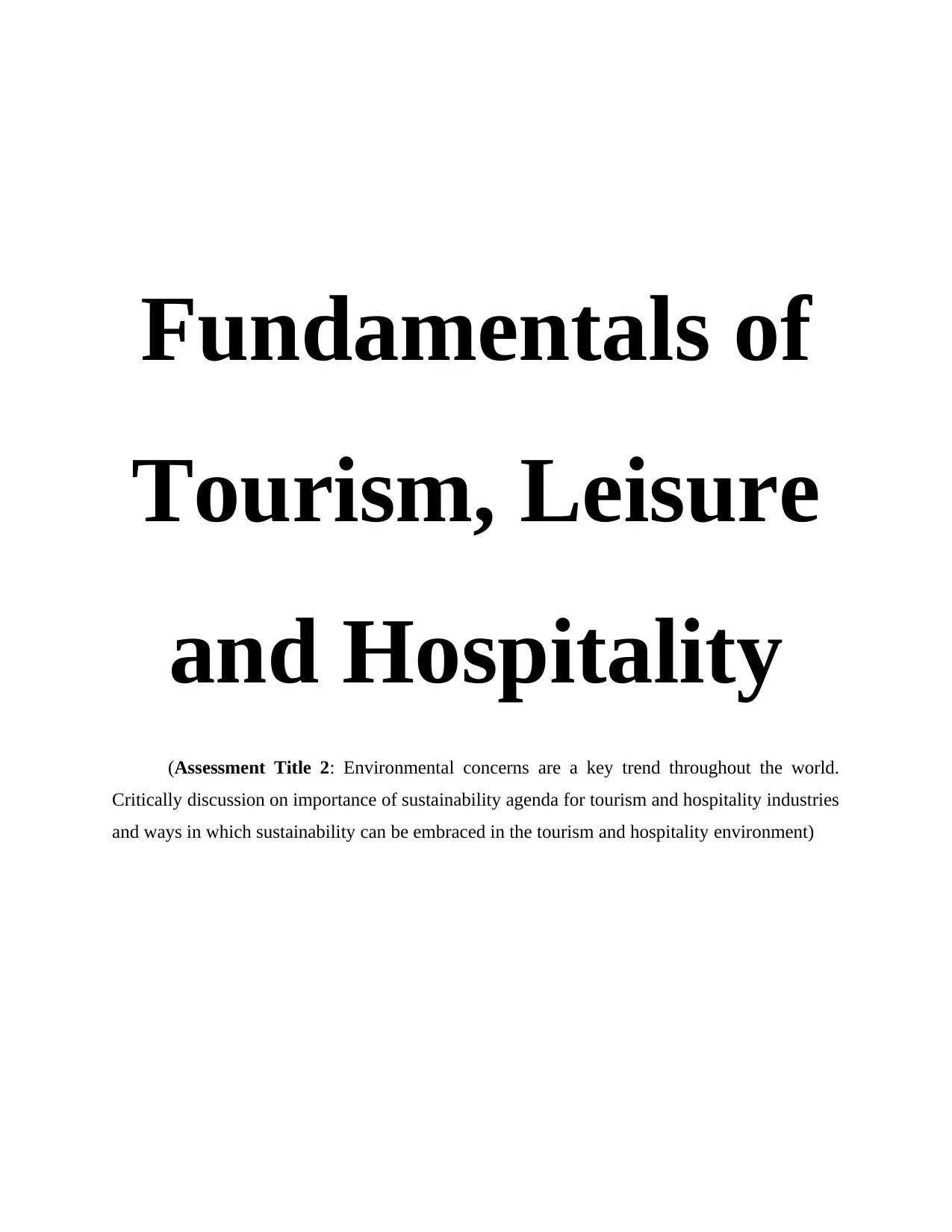
Fundamentals of
Tourism, Leisure
and Hospitality
(Assessment Title 2: Environmental concerns are a key trend throughout the world.
Critically discussion on importance of sustainability agenda for tourism and hospitality industries
and ways in which sustainability can be embraced in the tourism and hospitality environment)
Tourism, Leisure
and Hospitality
(Assessment Title 2: Environmental concerns are a key trend throughout the world.
Critically discussion on importance of sustainability agenda for tourism and hospitality industries
and ways in which sustainability can be embraced in the tourism and hospitality environment)
Secure Best Marks with AI Grader
Need help grading? Try our AI Grader for instant feedback on your assignments.

Table of Contents
INTRODUCTION...........................................................................................................................1
MAIN BODY...................................................................................................................................1
CONCLUSION................................................................................................................................8
REFERENCES................................................................................................................................9
INTRODUCTION...........................................................................................................................1
MAIN BODY...................................................................................................................................1
CONCLUSION................................................................................................................................8
REFERENCES................................................................................................................................9
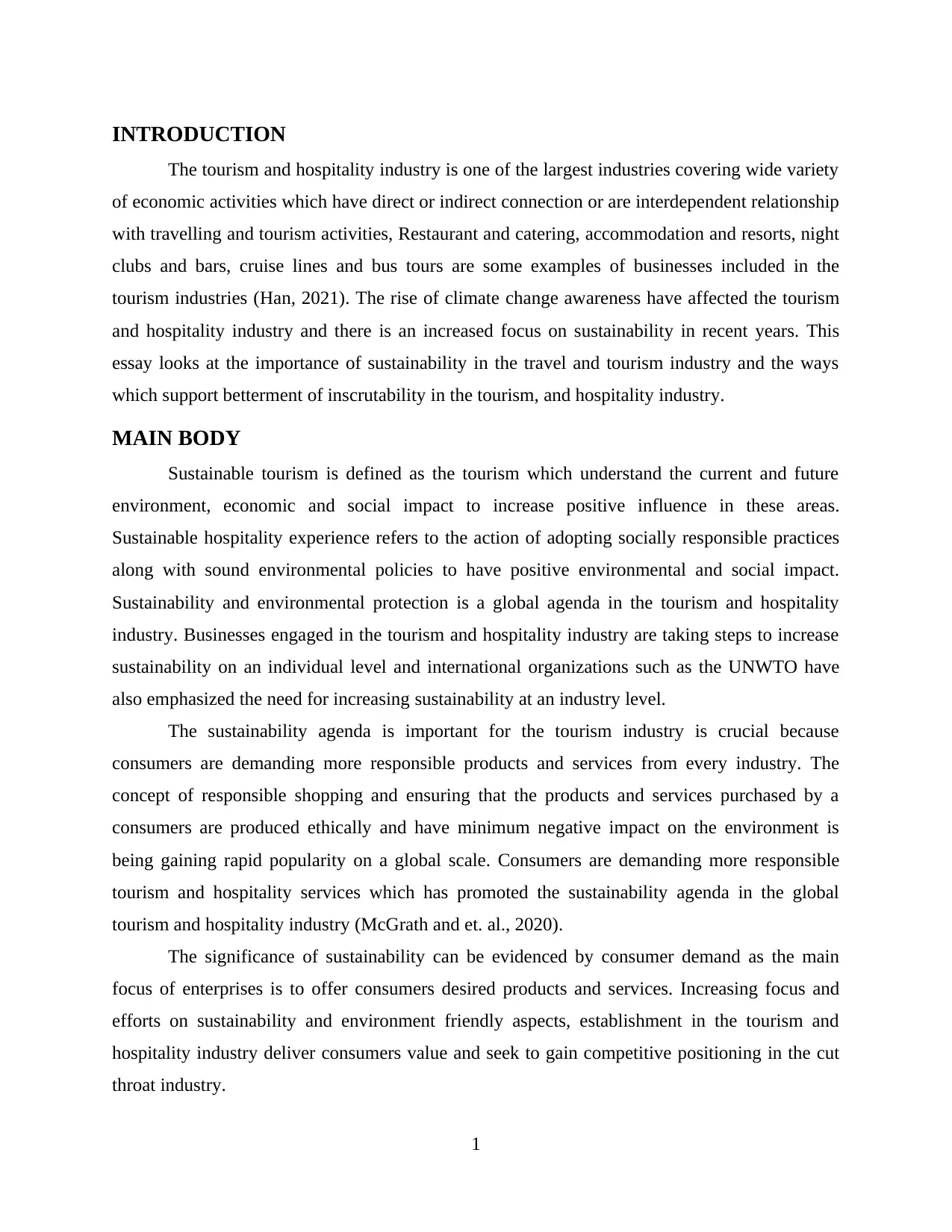
INTRODUCTION
The tourism and hospitality industry is one of the largest industries covering wide variety
of economic activities which have direct or indirect connection or are interdependent relationship
with travelling and tourism activities, Restaurant and catering, accommodation and resorts, night
clubs and bars, cruise lines and bus tours are some examples of businesses included in the
tourism industries (Han, 2021). The rise of climate change awareness have affected the tourism
and hospitality industry and there is an increased focus on sustainability in recent years. This
essay looks at the importance of sustainability in the travel and tourism industry and the ways
which support betterment of inscrutability in the tourism, and hospitality industry.
MAIN BODY
Sustainable tourism is defined as the tourism which understand the current and future
environment, economic and social impact to increase positive influence in these areas.
Sustainable hospitality experience refers to the action of adopting socially responsible practices
along with sound environmental policies to have positive environmental and social impact.
Sustainability and environmental protection is a global agenda in the tourism and hospitality
industry. Businesses engaged in the tourism and hospitality industry are taking steps to increase
sustainability on an individual level and international organizations such as the UNWTO have
also emphasized the need for increasing sustainability at an industry level.
The sustainability agenda is important for the tourism industry is crucial because
consumers are demanding more responsible products and services from every industry. The
concept of responsible shopping and ensuring that the products and services purchased by a
consumers are produced ethically and have minimum negative impact on the environment is
being gaining rapid popularity on a global scale. Consumers are demanding more responsible
tourism and hospitality services which has promoted the sustainability agenda in the global
tourism and hospitality industry (McGrath and et. al., 2020).
The significance of sustainability can be evidenced by consumer demand as the main
focus of enterprises is to offer consumers desired products and services. Increasing focus and
efforts on sustainability and environment friendly aspects, establishment in the tourism and
hospitality industry deliver consumers value and seek to gain competitive positioning in the cut
throat industry.
1
The tourism and hospitality industry is one of the largest industries covering wide variety
of economic activities which have direct or indirect connection or are interdependent relationship
with travelling and tourism activities, Restaurant and catering, accommodation and resorts, night
clubs and bars, cruise lines and bus tours are some examples of businesses included in the
tourism industries (Han, 2021). The rise of climate change awareness have affected the tourism
and hospitality industry and there is an increased focus on sustainability in recent years. This
essay looks at the importance of sustainability in the travel and tourism industry and the ways
which support betterment of inscrutability in the tourism, and hospitality industry.
MAIN BODY
Sustainable tourism is defined as the tourism which understand the current and future
environment, economic and social impact to increase positive influence in these areas.
Sustainable hospitality experience refers to the action of adopting socially responsible practices
along with sound environmental policies to have positive environmental and social impact.
Sustainability and environmental protection is a global agenda in the tourism and hospitality
industry. Businesses engaged in the tourism and hospitality industry are taking steps to increase
sustainability on an individual level and international organizations such as the UNWTO have
also emphasized the need for increasing sustainability at an industry level.
The sustainability agenda is important for the tourism industry is crucial because
consumers are demanding more responsible products and services from every industry. The
concept of responsible shopping and ensuring that the products and services purchased by a
consumers are produced ethically and have minimum negative impact on the environment is
being gaining rapid popularity on a global scale. Consumers are demanding more responsible
tourism and hospitality services which has promoted the sustainability agenda in the global
tourism and hospitality industry (McGrath and et. al., 2020).
The significance of sustainability can be evidenced by consumer demand as the main
focus of enterprises is to offer consumers desired products and services. Increasing focus and
efforts on sustainability and environment friendly aspects, establishment in the tourism and
hospitality industry deliver consumers value and seek to gain competitive positioning in the cut
throat industry.
1
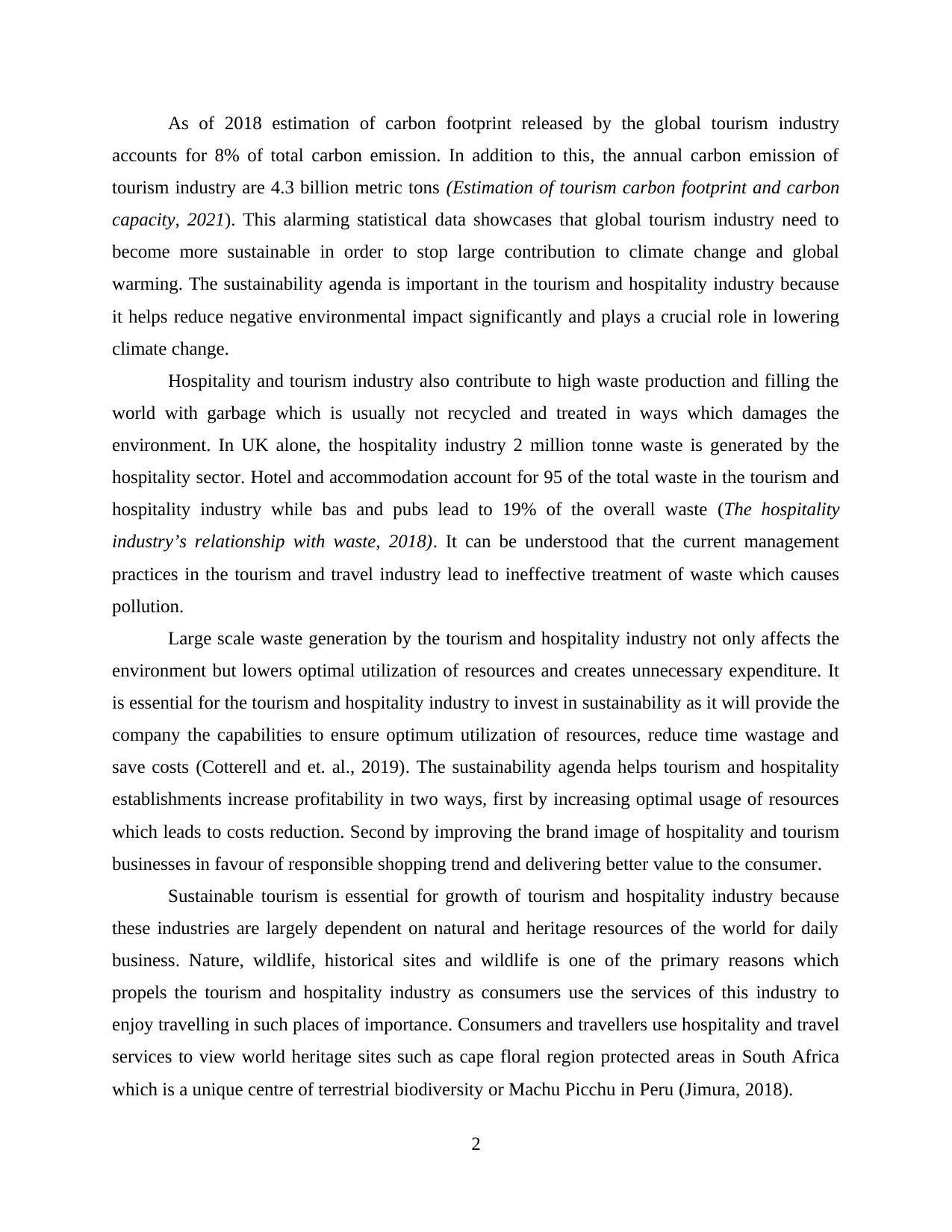
As of 2018 estimation of carbon footprint released by the global tourism industry
accounts for 8% of total carbon emission. In addition to this, the annual carbon emission of
tourism industry are 4.3 billion metric tons (Estimation of tourism carbon footprint and carbon
capacity, 2021). This alarming statistical data showcases that global tourism industry need to
become more sustainable in order to stop large contribution to climate change and global
warming. The sustainability agenda is important in the tourism and hospitality industry because
it helps reduce negative environmental impact significantly and plays a crucial role in lowering
climate change.
Hospitality and tourism industry also contribute to high waste production and filling the
world with garbage which is usually not recycled and treated in ways which damages the
environment. In UK alone, the hospitality industry 2 million tonne waste is generated by the
hospitality sector. Hotel and accommodation account for 95 of the total waste in the tourism and
hospitality industry while bas and pubs lead to 19% of the overall waste (The hospitality
industry’s relationship with waste, 2018). It can be understood that the current management
practices in the tourism and travel industry lead to ineffective treatment of waste which causes
pollution.
Large scale waste generation by the tourism and hospitality industry not only affects the
environment but lowers optimal utilization of resources and creates unnecessary expenditure. It
is essential for the tourism and hospitality industry to invest in sustainability as it will provide the
company the capabilities to ensure optimum utilization of resources, reduce time wastage and
save costs (Cotterell and et. al., 2019). The sustainability agenda helps tourism and hospitality
establishments increase profitability in two ways, first by increasing optimal usage of resources
which leads to costs reduction. Second by improving the brand image of hospitality and tourism
businesses in favour of responsible shopping trend and delivering better value to the consumer.
Sustainable tourism is essential for growth of tourism and hospitality industry because
these industries are largely dependent on natural and heritage resources of the world for daily
business. Nature, wildlife, historical sites and wildlife is one of the primary reasons which
propels the tourism and hospitality industry as consumers use the services of this industry to
enjoy travelling in such places of importance. Consumers and travellers use hospitality and travel
services to view world heritage sites such as cape floral region protected areas in South Africa
which is a unique centre of terrestrial biodiversity or Machu Picchu in Peru (Jimura, 2018).
2
accounts for 8% of total carbon emission. In addition to this, the annual carbon emission of
tourism industry are 4.3 billion metric tons (Estimation of tourism carbon footprint and carbon
capacity, 2021). This alarming statistical data showcases that global tourism industry need to
become more sustainable in order to stop large contribution to climate change and global
warming. The sustainability agenda is important in the tourism and hospitality industry because
it helps reduce negative environmental impact significantly and plays a crucial role in lowering
climate change.
Hospitality and tourism industry also contribute to high waste production and filling the
world with garbage which is usually not recycled and treated in ways which damages the
environment. In UK alone, the hospitality industry 2 million tonne waste is generated by the
hospitality sector. Hotel and accommodation account for 95 of the total waste in the tourism and
hospitality industry while bas and pubs lead to 19% of the overall waste (The hospitality
industry’s relationship with waste, 2018). It can be understood that the current management
practices in the tourism and travel industry lead to ineffective treatment of waste which causes
pollution.
Large scale waste generation by the tourism and hospitality industry not only affects the
environment but lowers optimal utilization of resources and creates unnecessary expenditure. It
is essential for the tourism and hospitality industry to invest in sustainability as it will provide the
company the capabilities to ensure optimum utilization of resources, reduce time wastage and
save costs (Cotterell and et. al., 2019). The sustainability agenda helps tourism and hospitality
establishments increase profitability in two ways, first by increasing optimal usage of resources
which leads to costs reduction. Second by improving the brand image of hospitality and tourism
businesses in favour of responsible shopping trend and delivering better value to the consumer.
Sustainable tourism is essential for growth of tourism and hospitality industry because
these industries are largely dependent on natural and heritage resources of the world for daily
business. Nature, wildlife, historical sites and wildlife is one of the primary reasons which
propels the tourism and hospitality industry as consumers use the services of this industry to
enjoy travelling in such places of importance. Consumers and travellers use hospitality and travel
services to view world heritage sites such as cape floral region protected areas in South Africa
which is a unique centre of terrestrial biodiversity or Machu Picchu in Peru (Jimura, 2018).
2
Secure Best Marks with AI Grader
Need help grading? Try our AI Grader for instant feedback on your assignments.
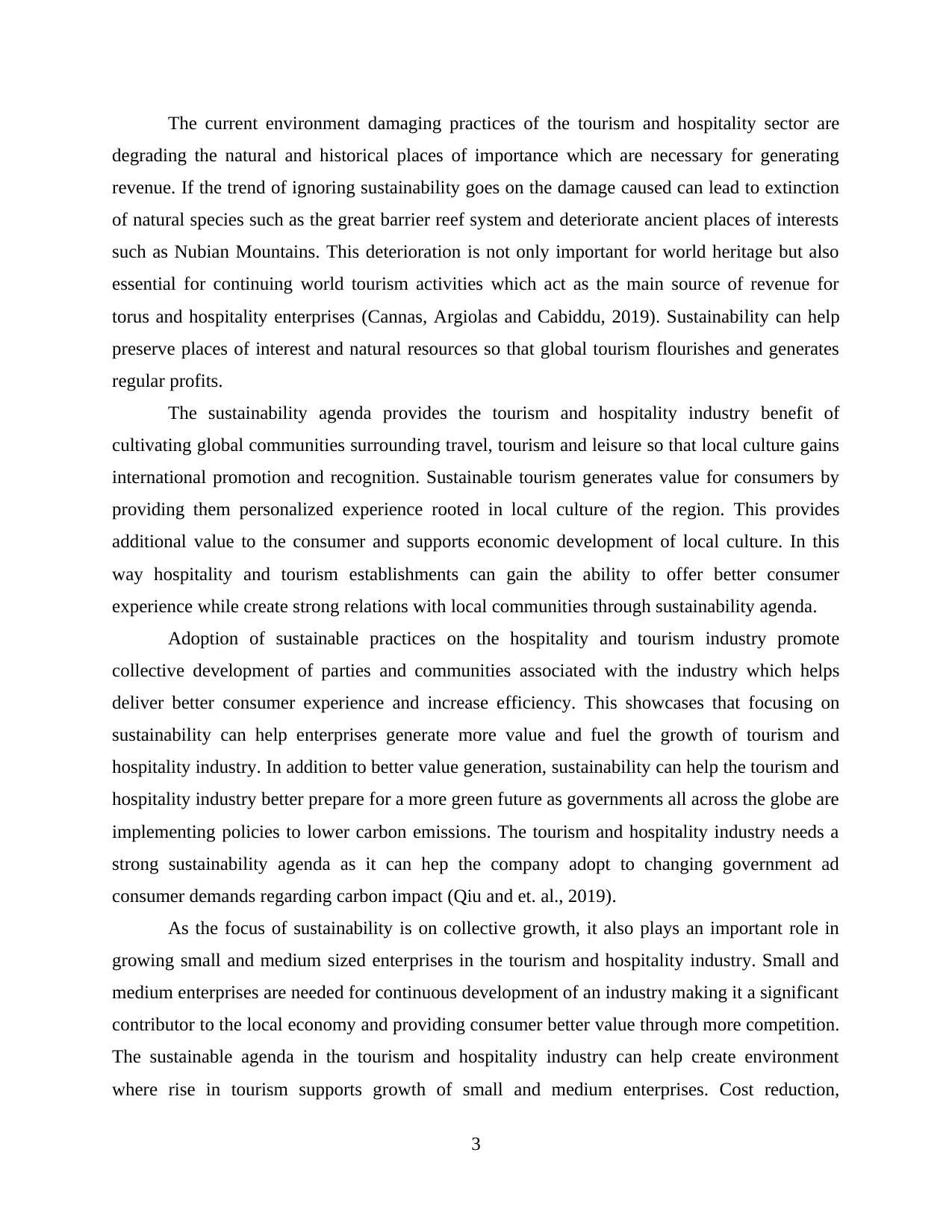
The current environment damaging practices of the tourism and hospitality sector are
degrading the natural and historical places of importance which are necessary for generating
revenue. If the trend of ignoring sustainability goes on the damage caused can lead to extinction
of natural species such as the great barrier reef system and deteriorate ancient places of interests
such as Nubian Mountains. This deterioration is not only important for world heritage but also
essential for continuing world tourism activities which act as the main source of revenue for
torus and hospitality enterprises (Cannas, Argiolas and Cabiddu, 2019). Sustainability can help
preserve places of interest and natural resources so that global tourism flourishes and generates
regular profits.
The sustainability agenda provides the tourism and hospitality industry benefit of
cultivating global communities surrounding travel, tourism and leisure so that local culture gains
international promotion and recognition. Sustainable tourism generates value for consumers by
providing them personalized experience rooted in local culture of the region. This provides
additional value to the consumer and supports economic development of local culture. In this
way hospitality and tourism establishments can gain the ability to offer better consumer
experience while create strong relations with local communities through sustainability agenda.
Adoption of sustainable practices on the hospitality and tourism industry promote
collective development of parties and communities associated with the industry which helps
deliver better consumer experience and increase efficiency. This showcases that focusing on
sustainability can help enterprises generate more value and fuel the growth of tourism and
hospitality industry. In addition to better value generation, sustainability can help the tourism and
hospitality industry better prepare for a more green future as governments all across the globe are
implementing policies to lower carbon emissions. The tourism and hospitality industry needs a
strong sustainability agenda as it can hep the company adopt to changing government ad
consumer demands regarding carbon impact (Qiu and et. al., 2019).
As the focus of sustainability is on collective growth, it also plays an important role in
growing small and medium sized enterprises in the tourism and hospitality industry. Small and
medium enterprises are needed for continuous development of an industry making it a significant
contributor to the local economy and providing consumer better value through more competition.
The sustainable agenda in the tourism and hospitality industry can help create environment
where rise in tourism supports growth of small and medium enterprises. Cost reduction,
3
degrading the natural and historical places of importance which are necessary for generating
revenue. If the trend of ignoring sustainability goes on the damage caused can lead to extinction
of natural species such as the great barrier reef system and deteriorate ancient places of interests
such as Nubian Mountains. This deterioration is not only important for world heritage but also
essential for continuing world tourism activities which act as the main source of revenue for
torus and hospitality enterprises (Cannas, Argiolas and Cabiddu, 2019). Sustainability can help
preserve places of interest and natural resources so that global tourism flourishes and generates
regular profits.
The sustainability agenda provides the tourism and hospitality industry benefit of
cultivating global communities surrounding travel, tourism and leisure so that local culture gains
international promotion and recognition. Sustainable tourism generates value for consumers by
providing them personalized experience rooted in local culture of the region. This provides
additional value to the consumer and supports economic development of local culture. In this
way hospitality and tourism establishments can gain the ability to offer better consumer
experience while create strong relations with local communities through sustainability agenda.
Adoption of sustainable practices on the hospitality and tourism industry promote
collective development of parties and communities associated with the industry which helps
deliver better consumer experience and increase efficiency. This showcases that focusing on
sustainability can help enterprises generate more value and fuel the growth of tourism and
hospitality industry. In addition to better value generation, sustainability can help the tourism and
hospitality industry better prepare for a more green future as governments all across the globe are
implementing policies to lower carbon emissions. The tourism and hospitality industry needs a
strong sustainability agenda as it can hep the company adopt to changing government ad
consumer demands regarding carbon impact (Qiu and et. al., 2019).
As the focus of sustainability is on collective growth, it also plays an important role in
growing small and medium sized enterprises in the tourism and hospitality industry. Small and
medium enterprises are needed for continuous development of an industry making it a significant
contributor to the local economy and providing consumer better value through more competition.
The sustainable agenda in the tourism and hospitality industry can help create environment
where rise in tourism supports growth of small and medium enterprises. Cost reduction,
3
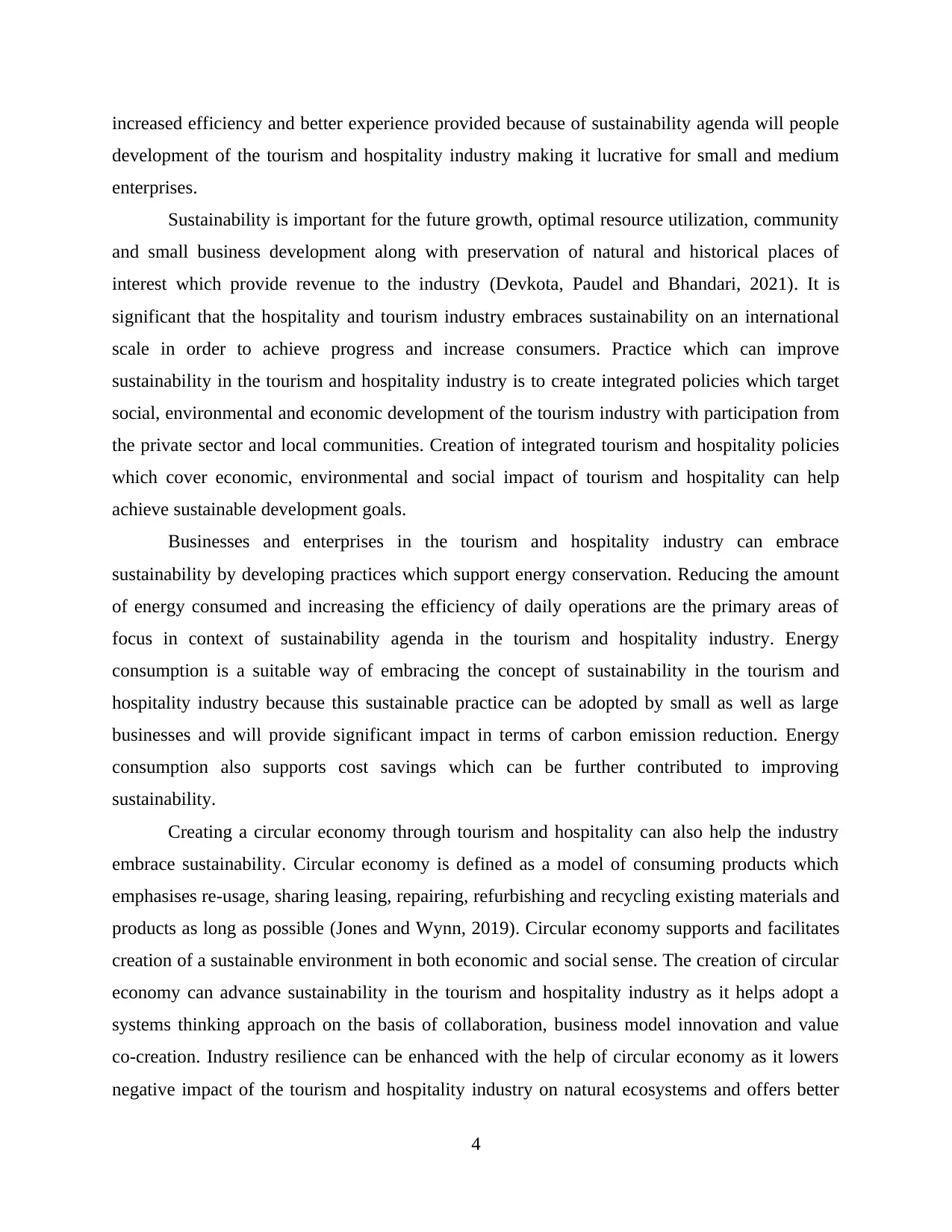
increased efficiency and better experience provided because of sustainability agenda will people
development of the tourism and hospitality industry making it lucrative for small and medium
enterprises.
Sustainability is important for the future growth, optimal resource utilization, community
and small business development along with preservation of natural and historical places of
interest which provide revenue to the industry (Devkota, Paudel and Bhandari, 2021). It is
significant that the hospitality and tourism industry embraces sustainability on an international
scale in order to achieve progress and increase consumers. Practice which can improve
sustainability in the tourism and hospitality industry is to create integrated policies which target
social, environmental and economic development of the tourism industry with participation from
the private sector and local communities. Creation of integrated tourism and hospitality policies
which cover economic, environmental and social impact of tourism and hospitality can help
achieve sustainable development goals.
Businesses and enterprises in the tourism and hospitality industry can embrace
sustainability by developing practices which support energy conservation. Reducing the amount
of energy consumed and increasing the efficiency of daily operations are the primary areas of
focus in context of sustainability agenda in the tourism and hospitality industry. Energy
consumption is a suitable way of embracing the concept of sustainability in the tourism and
hospitality industry because this sustainable practice can be adopted by small as well as large
businesses and will provide significant impact in terms of carbon emission reduction. Energy
consumption also supports cost savings which can be further contributed to improving
sustainability.
Creating a circular economy through tourism and hospitality can also help the industry
embrace sustainability. Circular economy is defined as a model of consuming products which
emphasises re-usage, sharing leasing, repairing, refurbishing and recycling existing materials and
products as long as possible (Jones and Wynn, 2019). Circular economy supports and facilitates
creation of a sustainable environment in both economic and social sense. The creation of circular
economy can advance sustainability in the tourism and hospitality industry as it helps adopt a
systems thinking approach on the basis of collaboration, business model innovation and value
co-creation. Industry resilience can be enhanced with the help of circular economy as it lowers
negative impact of the tourism and hospitality industry on natural ecosystems and offers better
4
development of the tourism and hospitality industry making it lucrative for small and medium
enterprises.
Sustainability is important for the future growth, optimal resource utilization, community
and small business development along with preservation of natural and historical places of
interest which provide revenue to the industry (Devkota, Paudel and Bhandari, 2021). It is
significant that the hospitality and tourism industry embraces sustainability on an international
scale in order to achieve progress and increase consumers. Practice which can improve
sustainability in the tourism and hospitality industry is to create integrated policies which target
social, environmental and economic development of the tourism industry with participation from
the private sector and local communities. Creation of integrated tourism and hospitality policies
which cover economic, environmental and social impact of tourism and hospitality can help
achieve sustainable development goals.
Businesses and enterprises in the tourism and hospitality industry can embrace
sustainability by developing practices which support energy conservation. Reducing the amount
of energy consumed and increasing the efficiency of daily operations are the primary areas of
focus in context of sustainability agenda in the tourism and hospitality industry. Energy
consumption is a suitable way of embracing the concept of sustainability in the tourism and
hospitality industry because this sustainable practice can be adopted by small as well as large
businesses and will provide significant impact in terms of carbon emission reduction. Energy
consumption also supports cost savings which can be further contributed to improving
sustainability.
Creating a circular economy through tourism and hospitality can also help the industry
embrace sustainability. Circular economy is defined as a model of consuming products which
emphasises re-usage, sharing leasing, repairing, refurbishing and recycling existing materials and
products as long as possible (Jones and Wynn, 2019). Circular economy supports and facilitates
creation of a sustainable environment in both economic and social sense. The creation of circular
economy can advance sustainability in the tourism and hospitality industry as it helps adopt a
systems thinking approach on the basis of collaboration, business model innovation and value
co-creation. Industry resilience can be enhanced with the help of circular economy as it lowers
negative impact of the tourism and hospitality industry on natural ecosystems and offers better
4
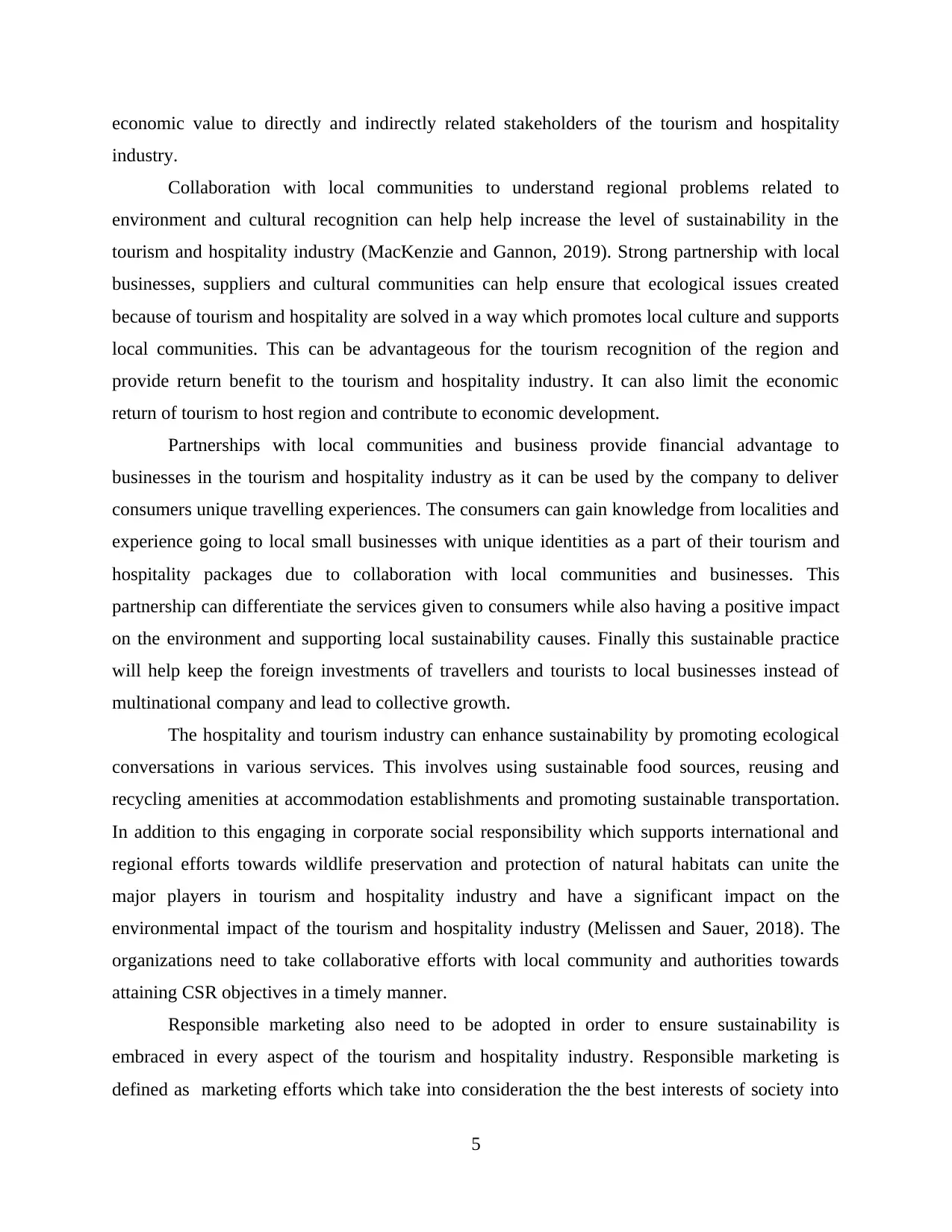
economic value to directly and indirectly related stakeholders of the tourism and hospitality
industry.
Collaboration with local communities to understand regional problems related to
environment and cultural recognition can help help increase the level of sustainability in the
tourism and hospitality industry (MacKenzie and Gannon, 2019). Strong partnership with local
businesses, suppliers and cultural communities can help ensure that ecological issues created
because of tourism and hospitality are solved in a way which promotes local culture and supports
local communities. This can be advantageous for the tourism recognition of the region and
provide return benefit to the tourism and hospitality industry. It can also limit the economic
return of tourism to host region and contribute to economic development.
Partnerships with local communities and business provide financial advantage to
businesses in the tourism and hospitality industry as it can be used by the company to deliver
consumers unique travelling experiences. The consumers can gain knowledge from localities and
experience going to local small businesses with unique identities as a part of their tourism and
hospitality packages due to collaboration with local communities and businesses. This
partnership can differentiate the services given to consumers while also having a positive impact
on the environment and supporting local sustainability causes. Finally this sustainable practice
will help keep the foreign investments of travellers and tourists to local businesses instead of
multinational company and lead to collective growth.
The hospitality and tourism industry can enhance sustainability by promoting ecological
conversations in various services. This involves using sustainable food sources, reusing and
recycling amenities at accommodation establishments and promoting sustainable transportation.
In addition to this engaging in corporate social responsibility which supports international and
regional efforts towards wildlife preservation and protection of natural habitats can unite the
major players in tourism and hospitality industry and have a significant impact on the
environmental impact of the tourism and hospitality industry (Melissen and Sauer, 2018). The
organizations need to take collaborative efforts with local community and authorities towards
attaining CSR objectives in a timely manner.
Responsible marketing also need to be adopted in order to ensure sustainability is
embraced in every aspect of the tourism and hospitality industry. Responsible marketing is
defined as marketing efforts which take into consideration the the best interests of society into
5
industry.
Collaboration with local communities to understand regional problems related to
environment and cultural recognition can help help increase the level of sustainability in the
tourism and hospitality industry (MacKenzie and Gannon, 2019). Strong partnership with local
businesses, suppliers and cultural communities can help ensure that ecological issues created
because of tourism and hospitality are solved in a way which promotes local culture and supports
local communities. This can be advantageous for the tourism recognition of the region and
provide return benefit to the tourism and hospitality industry. It can also limit the economic
return of tourism to host region and contribute to economic development.
Partnerships with local communities and business provide financial advantage to
businesses in the tourism and hospitality industry as it can be used by the company to deliver
consumers unique travelling experiences. The consumers can gain knowledge from localities and
experience going to local small businesses with unique identities as a part of their tourism and
hospitality packages due to collaboration with local communities and businesses. This
partnership can differentiate the services given to consumers while also having a positive impact
on the environment and supporting local sustainability causes. Finally this sustainable practice
will help keep the foreign investments of travellers and tourists to local businesses instead of
multinational company and lead to collective growth.
The hospitality and tourism industry can enhance sustainability by promoting ecological
conversations in various services. This involves using sustainable food sources, reusing and
recycling amenities at accommodation establishments and promoting sustainable transportation.
In addition to this engaging in corporate social responsibility which supports international and
regional efforts towards wildlife preservation and protection of natural habitats can unite the
major players in tourism and hospitality industry and have a significant impact on the
environmental impact of the tourism and hospitality industry (Melissen and Sauer, 2018). The
organizations need to take collaborative efforts with local community and authorities towards
attaining CSR objectives in a timely manner.
Responsible marketing also need to be adopted in order to ensure sustainability is
embraced in every aspect of the tourism and hospitality industry. Responsible marketing is
defined as marketing efforts which take into consideration the the best interests of society into
5
Paraphrase This Document
Need a fresh take? Get an instant paraphrase of this document with our AI Paraphraser
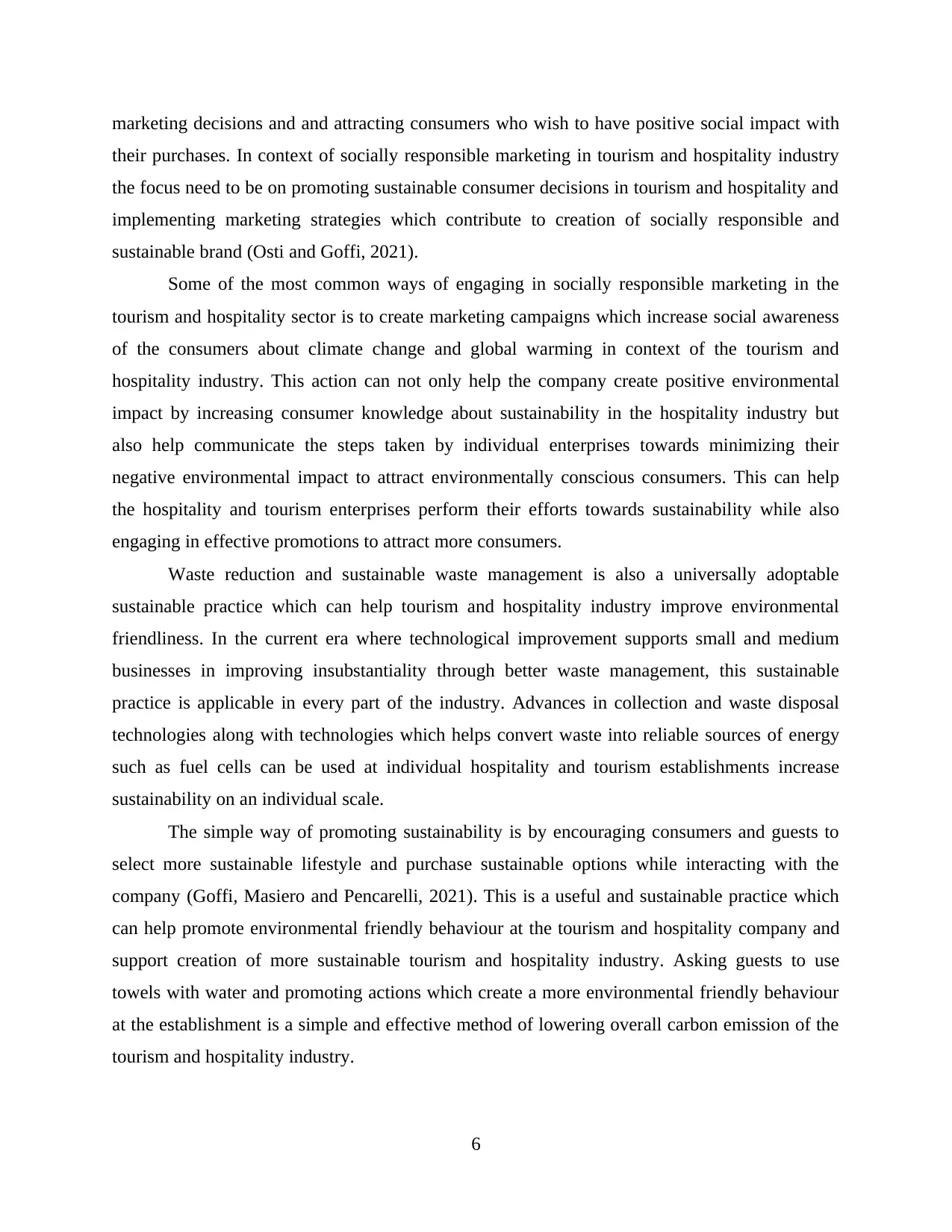
marketing decisions and and attracting consumers who wish to have positive social impact with
their purchases. In context of socially responsible marketing in tourism and hospitality industry
the focus need to be on promoting sustainable consumer decisions in tourism and hospitality and
implementing marketing strategies which contribute to creation of socially responsible and
sustainable brand (Osti and Goffi, 2021).
Some of the most common ways of engaging in socially responsible marketing in the
tourism and hospitality sector is to create marketing campaigns which increase social awareness
of the consumers about climate change and global warming in context of the tourism and
hospitality industry. This action can not only help the company create positive environmental
impact by increasing consumer knowledge about sustainability in the hospitality industry but
also help communicate the steps taken by individual enterprises towards minimizing their
negative environmental impact to attract environmentally conscious consumers. This can help
the hospitality and tourism enterprises perform their efforts towards sustainability while also
engaging in effective promotions to attract more consumers.
Waste reduction and sustainable waste management is also a universally adoptable
sustainable practice which can help tourism and hospitality industry improve environmental
friendliness. In the current era where technological improvement supports small and medium
businesses in improving insubstantiality through better waste management, this sustainable
practice is applicable in every part of the industry. Advances in collection and waste disposal
technologies along with technologies which helps convert waste into reliable sources of energy
such as fuel cells can be used at individual hospitality and tourism establishments increase
sustainability on an individual scale.
The simple way of promoting sustainability is by encouraging consumers and guests to
select more sustainable lifestyle and purchase sustainable options while interacting with the
company (Goffi, Masiero and Pencarelli, 2021). This is a useful and sustainable practice which
can help promote environmental friendly behaviour at the tourism and hospitality company and
support creation of more sustainable tourism and hospitality industry. Asking guests to use
towels with water and promoting actions which create a more environmental friendly behaviour
at the establishment is a simple and effective method of lowering overall carbon emission of the
tourism and hospitality industry.
6
their purchases. In context of socially responsible marketing in tourism and hospitality industry
the focus need to be on promoting sustainable consumer decisions in tourism and hospitality and
implementing marketing strategies which contribute to creation of socially responsible and
sustainable brand (Osti and Goffi, 2021).
Some of the most common ways of engaging in socially responsible marketing in the
tourism and hospitality sector is to create marketing campaigns which increase social awareness
of the consumers about climate change and global warming in context of the tourism and
hospitality industry. This action can not only help the company create positive environmental
impact by increasing consumer knowledge about sustainability in the hospitality industry but
also help communicate the steps taken by individual enterprises towards minimizing their
negative environmental impact to attract environmentally conscious consumers. This can help
the hospitality and tourism enterprises perform their efforts towards sustainability while also
engaging in effective promotions to attract more consumers.
Waste reduction and sustainable waste management is also a universally adoptable
sustainable practice which can help tourism and hospitality industry improve environmental
friendliness. In the current era where technological improvement supports small and medium
businesses in improving insubstantiality through better waste management, this sustainable
practice is applicable in every part of the industry. Advances in collection and waste disposal
technologies along with technologies which helps convert waste into reliable sources of energy
such as fuel cells can be used at individual hospitality and tourism establishments increase
sustainability on an individual scale.
The simple way of promoting sustainability is by encouraging consumers and guests to
select more sustainable lifestyle and purchase sustainable options while interacting with the
company (Goffi, Masiero and Pencarelli, 2021). This is a useful and sustainable practice which
can help promote environmental friendly behaviour at the tourism and hospitality company and
support creation of more sustainable tourism and hospitality industry. Asking guests to use
towels with water and promoting actions which create a more environmental friendly behaviour
at the establishment is a simple and effective method of lowering overall carbon emission of the
tourism and hospitality industry.
6

The final way through which the tourism and hospitality industry can promote sustainable
tourism is through sustainable sourcing. Increasing the usage of renewable energy sources,
recycled material and increasing local sourcing to reduce carbon emission caused by
transportation can support industry wide sustainability (Saarinen and Gill, 2018).
7
tourism is through sustainable sourcing. Increasing the usage of renewable energy sources,
recycled material and increasing local sourcing to reduce carbon emission caused by
transportation can support industry wide sustainability (Saarinen and Gill, 2018).
7
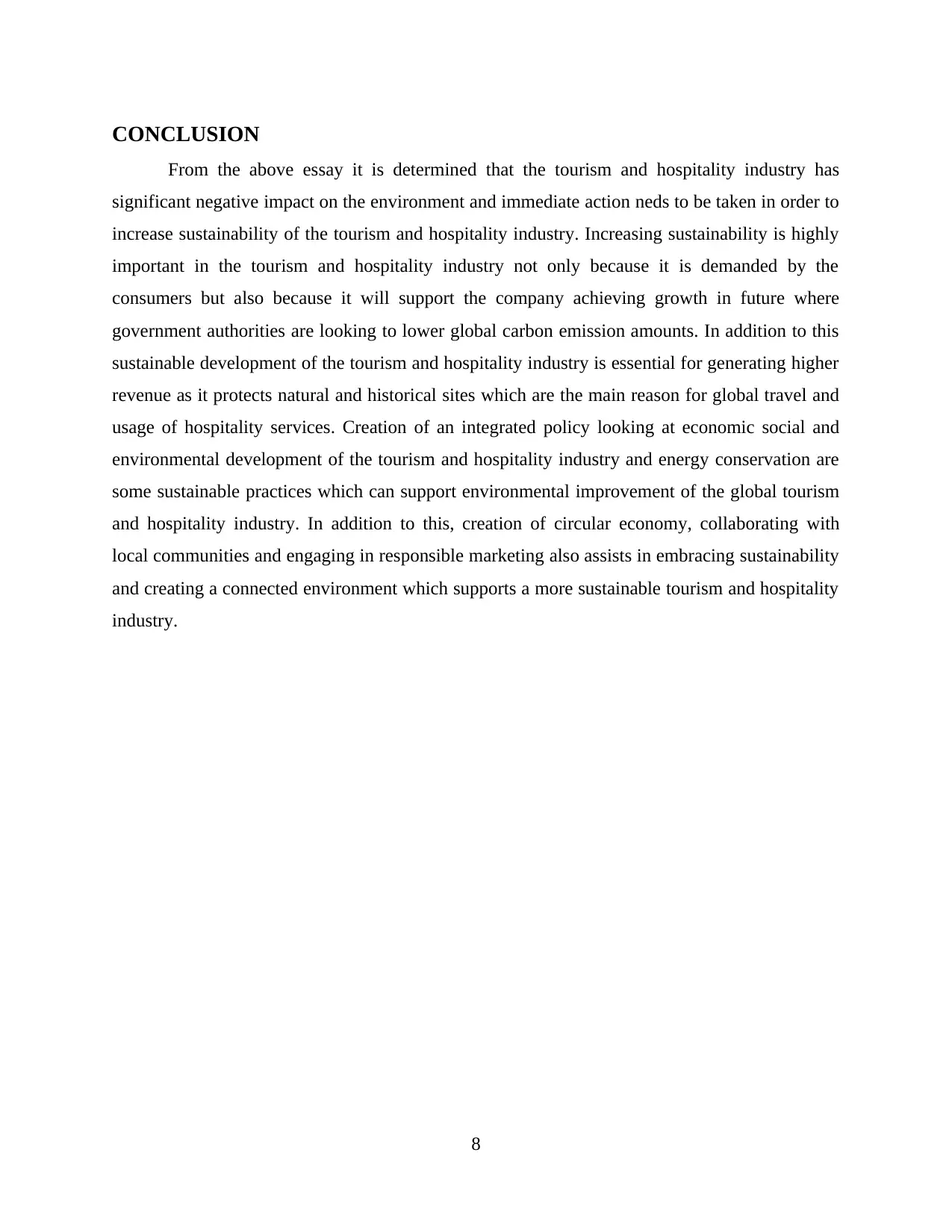
CONCLUSION
From the above essay it is determined that the tourism and hospitality industry has
significant negative impact on the environment and immediate action neds to be taken in order to
increase sustainability of the tourism and hospitality industry. Increasing sustainability is highly
important in the tourism and hospitality industry not only because it is demanded by the
consumers but also because it will support the company achieving growth in future where
government authorities are looking to lower global carbon emission amounts. In addition to this
sustainable development of the tourism and hospitality industry is essential for generating higher
revenue as it protects natural and historical sites which are the main reason for global travel and
usage of hospitality services. Creation of an integrated policy looking at economic social and
environmental development of the tourism and hospitality industry and energy conservation are
some sustainable practices which can support environmental improvement of the global tourism
and hospitality industry. In addition to this, creation of circular economy, collaborating with
local communities and engaging in responsible marketing also assists in embracing sustainability
and creating a connected environment which supports a more sustainable tourism and hospitality
industry.
8
From the above essay it is determined that the tourism and hospitality industry has
significant negative impact on the environment and immediate action neds to be taken in order to
increase sustainability of the tourism and hospitality industry. Increasing sustainability is highly
important in the tourism and hospitality industry not only because it is demanded by the
consumers but also because it will support the company achieving growth in future where
government authorities are looking to lower global carbon emission amounts. In addition to this
sustainable development of the tourism and hospitality industry is essential for generating higher
revenue as it protects natural and historical sites which are the main reason for global travel and
usage of hospitality services. Creation of an integrated policy looking at economic social and
environmental development of the tourism and hospitality industry and energy conservation are
some sustainable practices which can support environmental improvement of the global tourism
and hospitality industry. In addition to this, creation of circular economy, collaborating with
local communities and engaging in responsible marketing also assists in embracing sustainability
and creating a connected environment which supports a more sustainable tourism and hospitality
industry.
8
Secure Best Marks with AI Grader
Need help grading? Try our AI Grader for instant feedback on your assignments.
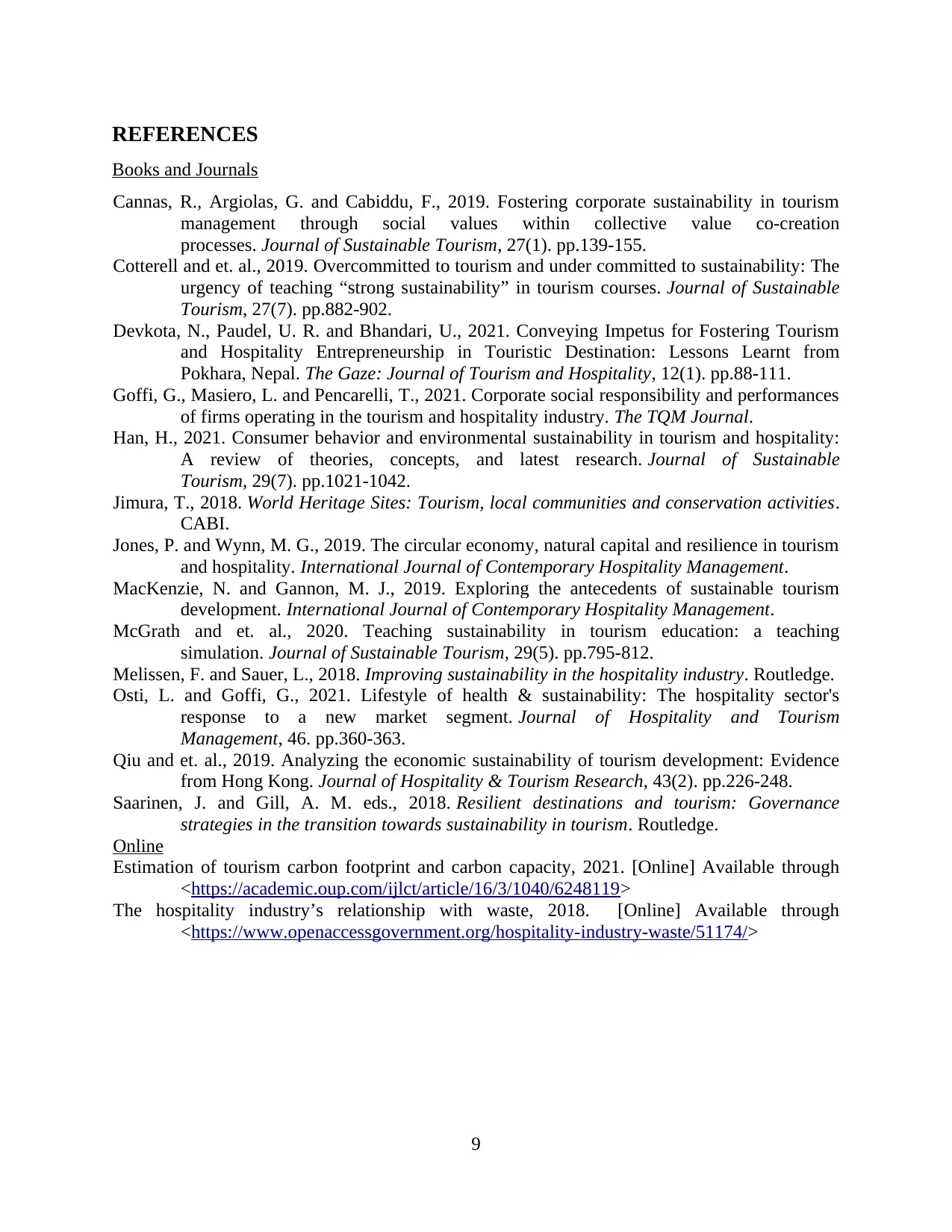
REFERENCES
Books and Journals
Cannas, R., Argiolas, G. and Cabiddu, F., 2019. Fostering corporate sustainability in tourism
management through social values within collective value co-creation
processes. Journal of Sustainable Tourism, 27(1). pp.139-155.
Cotterell and et. al., 2019. Overcommitted to tourism and under committed to sustainability: The
urgency of teaching “strong sustainability” in tourism courses. Journal of Sustainable
Tourism, 27(7). pp.882-902.
Devkota, N., Paudel, U. R. and Bhandari, U., 2021. Conveying Impetus for Fostering Tourism
and Hospitality Entrepreneurship in Touristic Destination: Lessons Learnt from
Pokhara, Nepal. The Gaze: Journal of Tourism and Hospitality, 12(1). pp.88-111.
Goffi, G., Masiero, L. and Pencarelli, T., 2021. Corporate social responsibility and performances
of firms operating in the tourism and hospitality industry. The TQM Journal.
Han, H., 2021. Consumer behavior and environmental sustainability in tourism and hospitality:
A review of theories, concepts, and latest research. Journal of Sustainable
Tourism, 29(7). pp.1021-1042.
Jimura, T., 2018. World Heritage Sites: Tourism, local communities and conservation activities.
CABI.
Jones, P. and Wynn, M. G., 2019. The circular economy, natural capital and resilience in tourism
and hospitality. International Journal of Contemporary Hospitality Management.
MacKenzie, N. and Gannon, M. J., 2019. Exploring the antecedents of sustainable tourism
development. International Journal of Contemporary Hospitality Management.
McGrath and et. al., 2020. Teaching sustainability in tourism education: a teaching
simulation. Journal of Sustainable Tourism, 29(5). pp.795-812.
Melissen, F. and Sauer, L., 2018. Improving sustainability in the hospitality industry. Routledge.
Osti, L. and Goffi, G., 2021. Lifestyle of health & sustainability: The hospitality sector's
response to a new market segment. Journal of Hospitality and Tourism
Management, 46. pp.360-363.
Qiu and et. al., 2019. Analyzing the economic sustainability of tourism development: Evidence
from Hong Kong. Journal of Hospitality & Tourism Research, 43(2). pp.226-248.
Saarinen, J. and Gill, A. M. eds., 2018. Resilient destinations and tourism: Governance
strategies in the transition towards sustainability in tourism. Routledge.
Online
Estimation of tourism carbon footprint and carbon capacity, 2021. [Online] Available through
<https://academic.oup.com/ijlct/article/16/3/1040/6248119>
The hospitality industry’s relationship with waste, 2018. [Online] Available through
<https://www.openaccessgovernment.org/hospitality-industry-waste/51174/>
9
Books and Journals
Cannas, R., Argiolas, G. and Cabiddu, F., 2019. Fostering corporate sustainability in tourism
management through social values within collective value co-creation
processes. Journal of Sustainable Tourism, 27(1). pp.139-155.
Cotterell and et. al., 2019. Overcommitted to tourism and under committed to sustainability: The
urgency of teaching “strong sustainability” in tourism courses. Journal of Sustainable
Tourism, 27(7). pp.882-902.
Devkota, N., Paudel, U. R. and Bhandari, U., 2021. Conveying Impetus for Fostering Tourism
and Hospitality Entrepreneurship in Touristic Destination: Lessons Learnt from
Pokhara, Nepal. The Gaze: Journal of Tourism and Hospitality, 12(1). pp.88-111.
Goffi, G., Masiero, L. and Pencarelli, T., 2021. Corporate social responsibility and performances
of firms operating in the tourism and hospitality industry. The TQM Journal.
Han, H., 2021. Consumer behavior and environmental sustainability in tourism and hospitality:
A review of theories, concepts, and latest research. Journal of Sustainable
Tourism, 29(7). pp.1021-1042.
Jimura, T., 2018. World Heritage Sites: Tourism, local communities and conservation activities.
CABI.
Jones, P. and Wynn, M. G., 2019. The circular economy, natural capital and resilience in tourism
and hospitality. International Journal of Contemporary Hospitality Management.
MacKenzie, N. and Gannon, M. J., 2019. Exploring the antecedents of sustainable tourism
development. International Journal of Contemporary Hospitality Management.
McGrath and et. al., 2020. Teaching sustainability in tourism education: a teaching
simulation. Journal of Sustainable Tourism, 29(5). pp.795-812.
Melissen, F. and Sauer, L., 2018. Improving sustainability in the hospitality industry. Routledge.
Osti, L. and Goffi, G., 2021. Lifestyle of health & sustainability: The hospitality sector's
response to a new market segment. Journal of Hospitality and Tourism
Management, 46. pp.360-363.
Qiu and et. al., 2019. Analyzing the economic sustainability of tourism development: Evidence
from Hong Kong. Journal of Hospitality & Tourism Research, 43(2). pp.226-248.
Saarinen, J. and Gill, A. M. eds., 2018. Resilient destinations and tourism: Governance
strategies in the transition towards sustainability in tourism. Routledge.
Online
Estimation of tourism carbon footprint and carbon capacity, 2021. [Online] Available through
<https://academic.oup.com/ijlct/article/16/3/1040/6248119>
The hospitality industry’s relationship with waste, 2018. [Online] Available through
<https://www.openaccessgovernment.org/hospitality-industry-waste/51174/>
9
1 out of 11
Related Documents
Your All-in-One AI-Powered Toolkit for Academic Success.
+13062052269
info@desklib.com
Available 24*7 on WhatsApp / Email
![[object Object]](/_next/static/media/star-bottom.7253800d.svg)
Unlock your academic potential
© 2024 | Zucol Services PVT LTD | All rights reserved.




